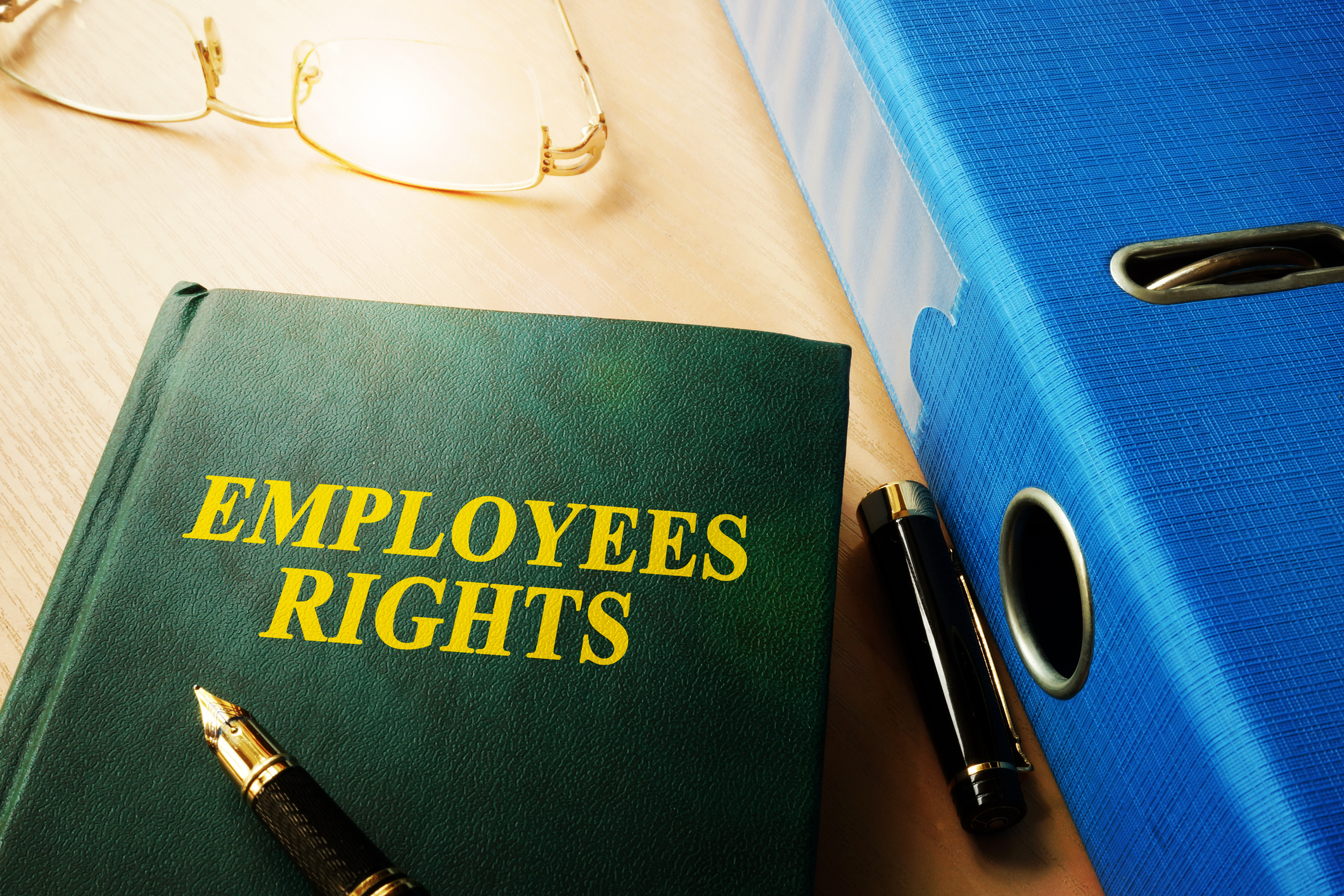The state of New York has many laws and regulations designed to protect workers’ physical and financial health. However, laws also help assure their employment is fair and payment is guaranteed.

New York State Human Rights Law
Alongside federal laws, New York state offers a bevy of specific protections for its workers. They are protected from discrimination, guaranteed health care coverage in certain situations, given mandatory accommodations during and after pregnancy, and are offered a much higher minimum wage than the federal standard.
The New York State Human Rights Law (NYSHRL) prohibits employers from discriminating against anyone seeking employment within these criteria:
- Age, as long as the applicant, intern, or employee is 18 years or older
- Race, religion, creed, color, or national origin
- Sex, sexual orientation, or gender identity and expression
- Disability or predisposing genetic characteristics
- Military status
- Familial or marital status
- Status as a victim of domestic violence
The NYSHRL covers various features protecting workers. Employers are required to meet these regulations or face legal actions and fines.
Employees may bring sexual harassment claims regardless of the size of the employer. Employers are prohibited from retaliating against any employee that brings forth a claim related to NYSHRL statutory language. Under NYSHRL, New York’s Compassionate Care Act (CCA) includes certified medical marijuana patients as having a disability. Certified patients are protected from negative actions based on health conditions and marijuana use.
Other protections under the NYSHRL include:
Equal pay
Employers must pay each employee of the same status the same wages regardless of protected classes, i.e. age, gender, nationality, etc. Different wage rates are permitted so long as the employer can justify the difference based on seniority, merit, or different categories of work quality. Otherwise, equal work which requires equal skill, effort, and responsibility under similar work requires equal pay.
Discussion of wages
Employees can’t be prohibited from discussing or disclosing their wages with fellow employees. Employers can limit these discussions during the workday and in the workplace only if they provide a written policy that otherwise complies with New York state laws.
Organizing
Employees can join together with coworkers to discuss work issues, including whether they wish to organize a new union or be represented by an existing union. Employers can’t threaten, discriminate, or otherwise take action against employees for organizing or discussing working conditions.
Pregnancy accommodation
An employer must provide reasonable accommodations for any medical conditions related to pregnancy or childbirth that inhibit normally bodily function or cause danger to the pregnant person or their fetus. This protection encompasses conditions that can be demonstrated through clinical or laboratory diagnostic techniques.
Whistleblower protections
Under the New York False Claims Act, any employee or professional affiliated with an organization can become a “whistleblower” and alert a local, state, or federal entity as to a possible violation of statutory or regulatory law. The act specifically requires employers to comply with the law that offers the greatest protection to workers in the event of conflicting requirements between state, federal, or local laws.
Other rights covered under New York labor laws
When it comes to hiring or employing qualified labor, employers must follow certain requirements by New York state law. If there is any overlap between federal, state, and local law, the employer must comply with the law that offers the employee the greatest benefits or rights.
Protections afforded under state laws include the following.
Recruiting and hiring new employees
Criminal checks
Those with a criminal conviction on their record can’t be discriminated against during the hiring process unless the employer can explicitly justify why the criminal offense means that the applicant is unqualified for the position or that they pose an “unreasonable risk” to others.
Credit checks
Under the New York Fair Credit Reporting Act (FCRA), employers are only permitted to require a credit check as part of the application process if they inform the applicant in writing in advance. Similarly, the employer can obtain an investigative consumer report, but only if the applicant is informed in advance and given the opportunity to authorize it.
Salary history inquiry restrictions
In New York, an employer may not rely on an applicant’s wage or salary history in determining how much they’ll pay them for the job they are applying for. They also can’t seek, request, or require an applicant or current employee’s wage history as a condition to consider for employment or promotion.
Furthermore, an employer can’t refuse to hire, promote, or otherwise employ an individual based on prior wage history, and they can’t discriminate based on whether or not the employee had filed a complaint with the Department of Labor alleging a violation. The applicant is allowed to disclose their wage history voluntarily, however. If the employer discovers the wage history through other means, they may be permitted to confirm it, under certain circumstances.
Child labor
Minors under the age of 18 are prohibited from working hazardous jobs, such as cleaning machinery, construction work, logging, and handling explosives. Minors are entitled to the same break times as adults, and they must have the required documents to be eligible for work.
Pay and benefits
- Wages must be paid in cash, check, direct deposit, or electronic pay cards.
- Employers are required to pay manual workers weekly, and payment must be rendered no more than seven calendar days after the end of the workweek.
- Clerical workers, a category that includes most office and administrative workers (colloquially known as “white-collar jobs”) have to be paid at least twice monthly.
- Wage deductions can only be made by an employer if they’re explicitly required by law, court decisions, or government agencies. Wages deductions may also be made for the benefit of the employee and authorized by them in writing. For example, payment for insurance premiums or pension benefits.
- Employers must provide employees with a pay statement every time they are paid disclosing the dates of applicable work, their rate of pay, all gross and net wages, and any deductions or allowances. In many situations, an electronic statement can be given in lieu of a paper pay stub.
- New York’s Wage Theft Prevention Act (WTPA) requires employers to provide written notice to new employees of certain information, such as pay rate or frequency, in English and the employee’s primary languages. Any changes must be provided within seven days before the change and require employees to sign a receipt acknowledging the notice.
Healthcare continuation and temporary disability insurance
Group health policies that cover 2-19 employees are required to continue benefits after termination of employment, mirroring the federal COBRA coverage. New York state law is more generous, however, as it requires group policies issued by employers to continue for 36 months rather than the federally mandated eighteen.
Temporary Disability Insurance partially covers wages for up to 26 weeks in one calendar year while an employee is unable to work because of non-work-related injuries, illnesses, or pregnancy-related disabilities. The cost may be shared between employers and employees, but employers must pay for plans that do not cover employee contributions.
Time off and leave of absence
Employees can receive paid family leave, which is 60% of their average weekly wage that is granted for 10 weeks during any 52-week calendar period. Benefits, which are paid through weekly payroll deductions, may be taken to care for a family member with a serious health condition, to bond with a newborn or newly placed adopted/foster child, and for certain events arising out of the employee’s spouse/domestic partner/child/parent being on active duty with the U.S. armed forces.
When the employee returns to work, they have to be given either the exact same position they once had or a comparable position with equivalent pay and responsibilities.
Other requirements include:
- Military leave or military spouse leave
- Voting or jury duty leave
- Crime victims/witness leave
- Domestic violence leave
- Blood or bone marrow donor leave
- Emergency responder leave
- Day of rest requirements for the employee’s religion or faith
Employee health and safety
New York employers must provide a safe working environment for their employees. The Clean Indoor Air Act prohibits smoking in indoor areas and workplaces, and appropriate signage is required. New York bans all texting and hand-held cellphone use while driving, and employers can’t require employees to break those restrictions.
Layoffs and exit pay
The New York State Worker Adjustment and Retraining Notification Act requires employers to provide 90 days’ advance written notification of mass layoffs, plant closings, or workplace relocation. The employee’s union representative, New York State Department of Labor, and the local workforce enforcement board must also be notified. The exceptions include natural calamity or acts of war.
Talk to an experienced workplace injury lawyer in New York
While New York state provides a lot of protections for employees, the myriad rights are a lot to keep up with. Both workers and employers could use some help keeping it all in perspective. This can be especially true in situations where there is an on-the-job injury, and liability for the injury’s costs aren’t clear.

Between hospital bills, lost wages, pain and suffering, and other consequences of a workplace injury, your damages might be quite extensive. Let us provide you with an experienced New York injury lawyer to represent your claim and help you determine the most appropriate legal action to take given the circumstances of your injury and any non-employer third parties involved.
Learn more about your rights after an injury and what legal options for compensation you have available during a free, no-obligation consultation with a New York injury attorney near you. Call us at The Weinstein Group at 212-741-3800 or contact us online to schedule your free appointment now. We have the knowledge and experience to help you figure it out and get paid what you’re owed for the work you do. Contact us today.


